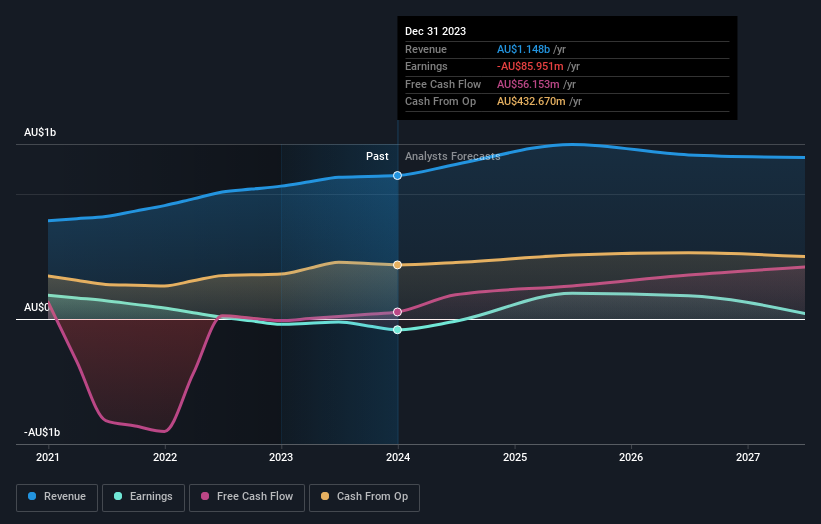- Australia
- /
- Metals and Mining
- /
- ASX:RRL
Regis Resources (ASX:RRL) shareholders are up 9.3% this past week, but still in the red over the last five years

Statistically speaking, long term investing is a profitable endeavour. But that doesn't mean long term investors can avoid big losses. For example, after five long years the Regis Resources Limited (ASX:RRL) share price is a whole 70% lower. That is extremely sub-optimal, to say the least. Furthermore, it's down 12% in about a quarter. That's not much fun for holders.
Although the past week has been more reassuring for shareholders, they're still in the red over the last five years, so let's see if the underlying business has been responsible for the decline.
View our latest analysis for Regis Resources
Regis Resources isn't currently profitable, so most analysts would look to revenue growth to get an idea of how fast the underlying business is growing. Generally speaking, companies without profits are expected to grow revenue every year, and at a good clip. That's because fast revenue growth can be easily extrapolated to forecast profits, often of considerable size.
Over five years, Regis Resources grew its revenue at 13% per year. That's a pretty good rate for a long time period. The share price return isn't so respectable with an annual loss of 11% over the period. It seems probably that the business has failed to live up to initial expectations. That could lead to an opportunity if the company is going to become profitable sooner rather than later.
You can see how earnings and revenue have changed over time in the image below (click on the chart to see the exact values).

Regis Resources is well known by investors, and plenty of clever analysts have tried to predict the future profit levels. If you are thinking of buying or selling Regis Resources stock, you should check out this free report showing analyst consensus estimates for future profits.
What About The Total Shareholder Return (TSR)?
We've already covered Regis Resources' share price action, but we should also mention its total shareholder return (TSR). The TSR is a return calculation that accounts for the value of cash dividends (assuming that any dividend received was reinvested) and the calculated value of any discounted capital raisings and spin-offs. Dividends have been really beneficial for Regis Resources shareholders, and that cash payout explains why its total shareholder loss of 65%, over the last 5 years, isn't as bad as the share price return.
A Different Perspective
Regis Resources shareholders are down 14% for the year, but the market itself is up 14%. Even the share prices of good stocks drop sometimes, but we want to see improvements in the fundamental metrics of a business, before getting too interested. Unfortunately, longer term shareholders are suffering worse, given the loss of 11% doled out over the last five years. We would want clear information suggesting the company will grow, before taking the view that the share price will stabilize. Most investors take the time to check the data on insider transactions. You can click here to see if insiders have been buying or selling.
Of course Regis Resources may not be the best stock to buy. So you may wish to see this free collection of growth stocks.
Please note, the market returns quoted in this article reflect the market weighted average returns of stocks that currently trade on Australian exchanges.
New: AI Stock Screener & Alerts
Our new AI Stock Screener scans the market every day to uncover opportunities.
• Dividend Powerhouses (3%+ Yield)
• Undervalued Small Caps with Insider Buying
• High growth Tech and AI Companies
Or build your own from over 50 metrics.
Have feedback on this article? Concerned about the content? Get in touch with us directly. Alternatively, email editorial-team (at) simplywallst.com.
This article by Simply Wall St is general in nature. We provide commentary based on historical data and analyst forecasts only using an unbiased methodology and our articles are not intended to be financial advice. It does not constitute a recommendation to buy or sell any stock, and does not take account of your objectives, or your financial situation. We aim to bring you long-term focused analysis driven by fundamental data. Note that our analysis may not factor in the latest price-sensitive company announcements or qualitative material. Simply Wall St has no position in any stocks mentioned.
Have feedback on this article? Concerned about the content? Get in touch with us directly. Alternatively, email editorial-team@simplywallst.com
About ASX:RRL
Regis Resources
Engages in the exploration, evaluation, and development of gold projects in Australia.
Good value with adequate balance sheet.


